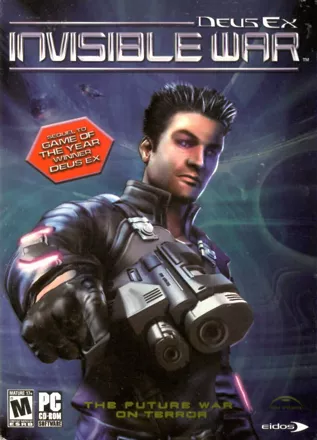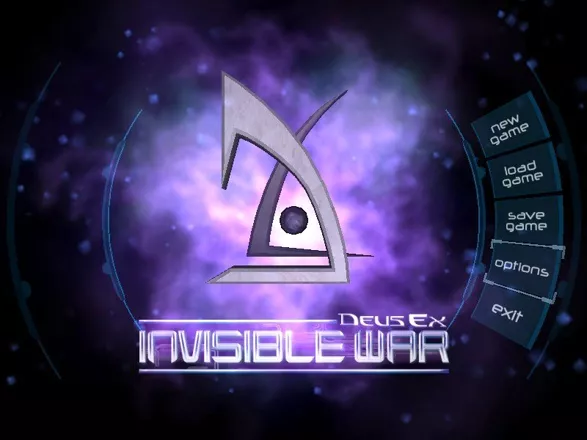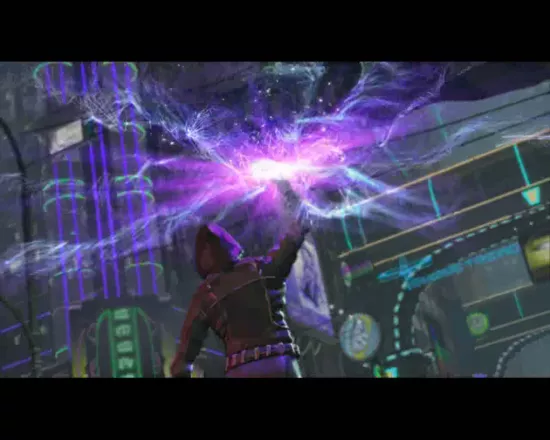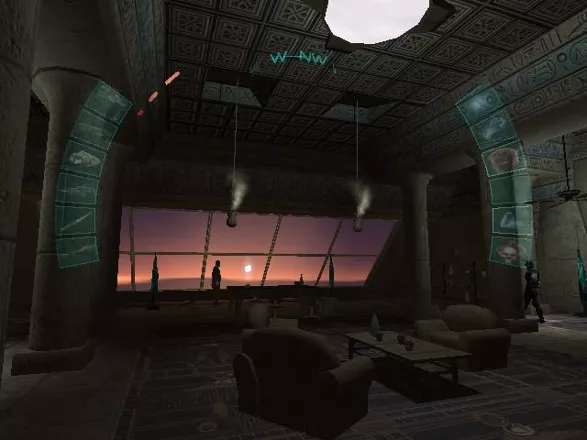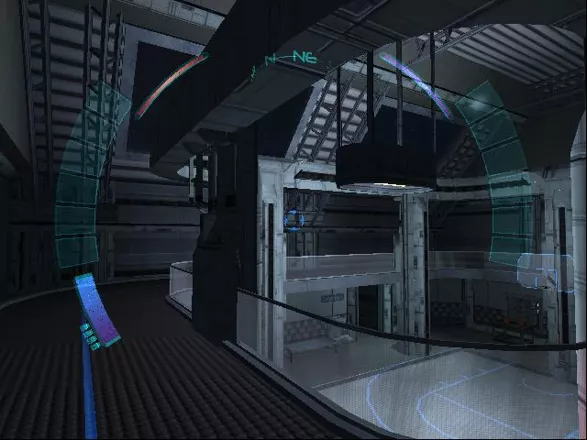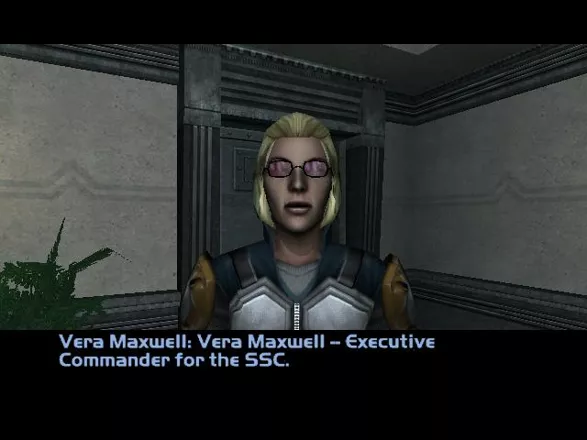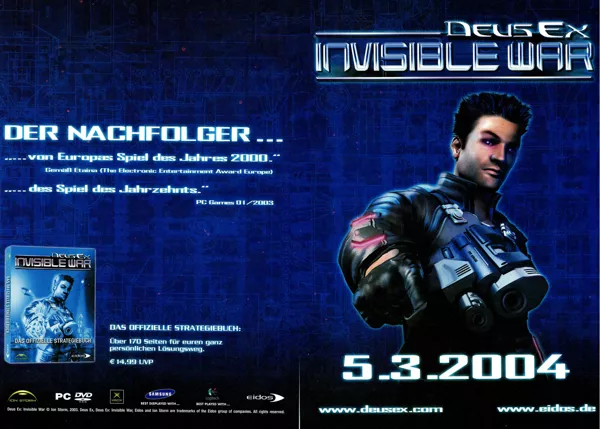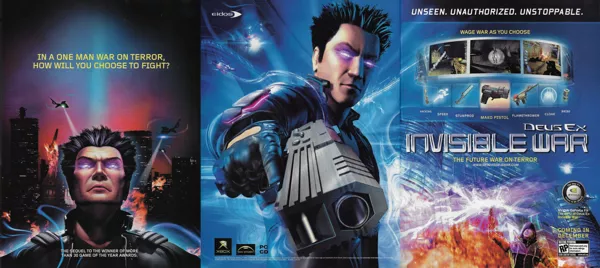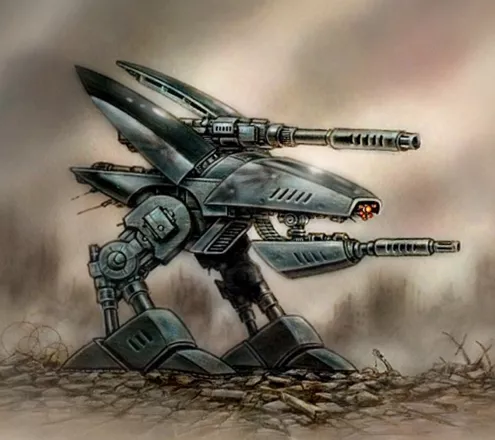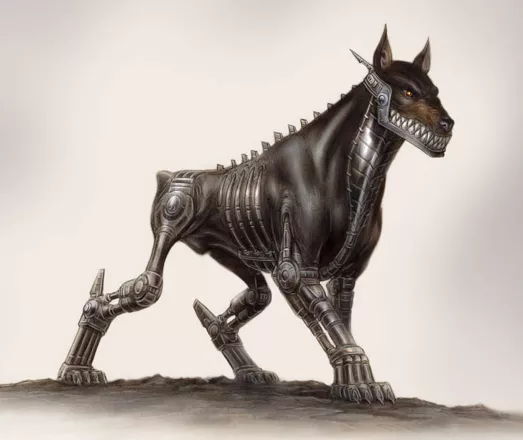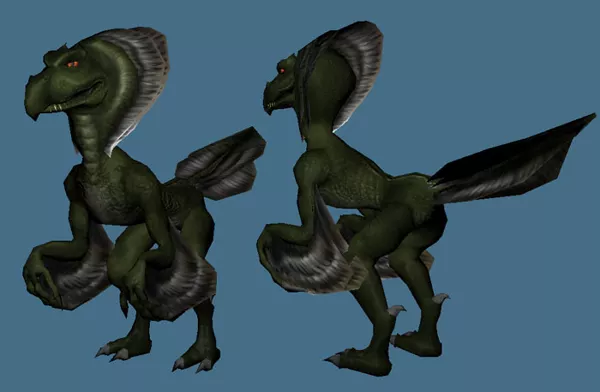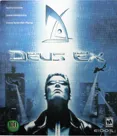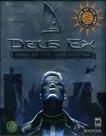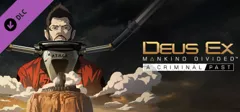Deus Ex: Invisible War
Description official descriptions
Twenty years have passed after the events described in Deus Ex. The actions of JC Denton have eventually led to a period of economic depression, known as "The Collapse". The world is on the brink of chaos after the dismantling of the mighty biotech corporations, and multiple religious and political groups lust after power.
The city of Chicago is destroyed in a devastating energy blast by unknown terrorists. Two trainees of the Tarsus Academy, Alex D and Billie Adams, are evacuated to another Tarsus-controlled facility in Seattle. Shortly thereafter the facility is attacked by members of a religious organization called the Order. Billie admits that she has been collaborating with them, implying that Tarsus may be involved in a conspiracy. It is now up to Alex to find his or her place in the new world, and ultimately shape its fate.
Deus Ex: Invisible War is a first-person shooter that retains many gameplay elements of its predecessor, such as conversations with characters, inventory management, exploration, and mixing various gameplay styles during missions. As in the original game, the style of play helps shape the game as it progresses, from how characters interact with the protagonist to the types of situations encountered. Each potential conflict can be resolved in a number of ways, through peaceful means or through violence, using stealth or a show of force. Hacking computer terminals and unlocking doors with special tools are prominently featured.
Weapons can be modified in a variety of ways, e.g. increasing their rate of fire, silencing the shots, allowing the weapon to shoot through glass, etc. Characters can once again outfit their bodies with an array of biotech parts, some of which include the ability to see through walls, disappear from radar, regenerate from critical hits, or jump forty feet in the air. Unlike the previous installment, there are no true role-playing elements in the game. The player must search for biotech canisters to install and upgrade biomods; however, no experience points are awarded for either completing missions or dealing with enemies. Inventory management has been simplified as well.
The sequel places more emphasis on decisions and different approaches to missions. From the beginning of the game the player has the freedom of performing missions for organizations and people of his or her choice. Like in the first game, several endings can be reached depending on the player's decisions.
Spellings
- 杀出重围:隐形战争 - Simplified Chinese spelling
- 駭客入侵 - Traditional Chinese spelling
Groups +
- 3D Engine: Unreal Engine 2
- Console Generation Exclusives: Xbox
- Deus Ex series
- Gameplay feature: Multiple endings
- Games with 451
- Green Pepper releases
- Middleware: Bink Video
- Middleware: FaceFX
- PC Gamer Presents games
- Physics Engine: Havok
- Protagonist: Cyborg
- Protagonist: Female (option)
- Setting: Arctic / North Pole
- Setting: City - Cairo
- Setting: City - Chicago
- Setting: City - New York
- Setting: City - Seattle
- Software Pyramide releases
- Theme: Hacking / Pseudohacking
- Theme: School
Screenshots
Promos
Videos
Add Trailer or Gameplay Video +1 point
See any errors or missing info for this game?
You can submit a correction, contribute trivia, add to a game group, add a related site or alternate title.
Credits (Windows version)
276 People (233 developers, 43 thanks) · View all
| Studio Director | |
| Project Director | |
| Executive Producer | |
| Producer | |
| Associate Producer | |
| Lead Programmer | |
| Programmers | |
| Additional Programming | |
| Director of Technology | |
| Lead Technology Programmer | |
| [ full credits ] | |
Reviews
Critics
Average score: 79% (based on 64 ratings)
Players
Average score: 3.4 out of 5 (based on 152 ratings with 16 reviews)
The Good
The Bad
The Bottom Line
The original Deus Ex threw the first person genre into a loop, rather than conforming to established methods, it combined role playing, stealth, shooting, and adventure gaming into one neat little package. It had a very cool story which dealt with government conspiracies and changed around as you played. It was one of the few true "choice" systems that actually managed to conform to your playing style and keep you fully immersed rather than asking you to make a junction with a limited choice set.
I missed out on much of the last generation of gaming, but I did play Deus Ex and I loved it. Yet everyone kept telling me how terrible Invisible War was, but regardless I wanted to at least play it. And I have to ask... why all the hate? No, its not the sequel it could have been, but its still a very cool game with a heavy adventure element.
The story takes place 20 years after the events of the first game. After the destruction of Area 51 and the death of the man in charge of the Majestic 12, the world's government falls to pieces and leaves the world in an economic depression known as the collapse. Like in the first game, terrorism is seemingly common place now, no one is truly safe and no one is truly trustworthy. Global fear and panic naturally ensues.
Meanwhile, the augmentation project from the first game has taken a step up, able to genetically alter humans. This too causes unrest, people afraid of what an augmented human can truly do when the sky is practically the limit. The game begins with a terrorist attack on Chicago, and focuses on a corporation known as Tarsus. Relocating to Seattle, you are young Tarsus Academy student Alex D. Even there you are not safe as the Tarsus Academy is attacked, but the veil is slowly lifted when Tarsus is truly treating its students as lab rats for even further human augmentation and breeding genetic soldiers. This is where the game leaves you with the questions and as you progress, the story will take you for many twists and turns, much like its predecessor.
It also helps the story that the developers have expanded the games universe more. Although some things seem a little too high tech for a global depression, it does have a nice art design and there are many new facets of the series' universe which make it a richer and more diverse one. The story is a little easier to follow than its predecessor, even if it doesn't carry the same impact. My biggest flaw with the story here is that a plot point the game treats like a twist later on is made obvious right at the start. Your characters name is Alex D. What "D" stands for is a little too obvious to anyone who has played the first title.
The gameplay from its predecessor is largely intact, save for one element. While the Stealth, exploration, and shooting are all here in pristine condition the RPG elements have wandered off somewhere and are rarely heard from. You do not gain experience or skills, augmentation canisters are more common and save for black market or "professional" mods, they let you pick any augmentation you want right off the bat rather than having each augmentation canister have a unique trait. Upgrade canisters are gone as well, with upgrades available with each augmentation canister. The game also takes away your notes and makes keypads and other such devices instant use, provided you found that datacube. This does fracture the immersion some, and while the game is still highly immersive, it will not keep you glued to your chair as long as its predecessor due to this.
The dumbed down RPG elements are the weakest element of Invisible War and I too, was pissed at first and ready to condemn it like most other fans of the first game. But don't be so quick to condemn it, once you simmer down and have explored the world a bit, you will be hooked. At least I was. Once again, an important element of what made the first game unique shows up here: Exploration and adventure. They did not dumb this element down, and exploring the rich world is just as rewarding as it ever was. The adventure elements, like its predecessor, actually conform to your gameplay style rather than providing simple junctions like most games with a "choice" element. Granted, there are some exceptions here where you do make crucial choices from a tree, but they only open up separate possibilities and this element is really just to choose which faction to side with. The game will still evolve as you play, which keeps it a replayable and fresh experience.
The graphics, like its predecessor, are... well, "Meh." The Unreal 2.0 engine is used this time, and similar to how the first game failed to use the power of the first Unreal engine, this game doesn't make use of its powerful engine. Characters have creepy faces that stare with an occasional sprite blinking for them and they animate minimally. Textures are extremely low resolution. About the only thing the graphics really have going for them are some terrific lighting effects. The lighting is great and shadowing is realistic. Apparently the lower res graphics/textures were used to facilitate the Xbox, but that is not an excuse. Doom 3 had an engine tailored for the PC and the Xbox, but the PC version still took advantage of any extra hardware.
Another problem with the graphics are the framerates. Due to some very sloppy code, the game has performance issues up the butt. Sometimes, even on a modern computer, the framerate can dive and jitter. The games simplistic system requirements are misleading, and when I first bought it I was going to install it on the laptop I bought 2 years ago and play it on a roadtrip, and despite that Laptop being able to play some notorious system hogs such as S.T.A.L.K.E.R., but with the shadowing on the game ran at an unplayable 6 frames per second and with those effects off, 14 was an improvement but still pathetic.
I didn't have too much problem running it on my Desktop, but there were still dives and jitters and apparently everyone had these problems. Its one thing to neglect visual detail to facilitate a console, but you shouldn't neglect solid coding to facilitate a console instead.
Regardless, the game world is still highly immersive and fun to explore and will take you to many locales through the course of its story. The game is noticeably shorter than the first game, whereas the first game could take a solid 28+ hours to complete, Invisible War clocks in around 18. Granted, that's not bad and there is so much to see and do that that number would be higher if I were including side quests and such, I am only focusing on a dry run of the main plot length to gauge that number.
The music is really cool. Like its predecessor, the sound has a techno-ish vibe that fits the Cyberpunk style like a glove. There are lots of cool highlights, and the game also has one of the best fictional artists I've heard in awhile. What I mean by this is that there is a female techno/pop rock artist who exists solely in the games universe, but her music appears in the game universe and it ain't half bad. I'll admit that I pretended to dance to one of her tunes at the club where you first hear them. Granted that style of music may not be for everyone, but I certainly dug it.
The games shooting elements are base, but they work and can be expanded. You can still modify your guns, and the modification is a bit more balanced this time. In the first game, I had a pistol with a scope, 5 accuracy upgrades, 2 clip upgrades, a laser sight, a silencer and armour piercing bullets. Although it was kinda cool crafting a unique pistol through the upgrades, that pistol was overpowered as hell. About the only other fictional handgun I can think of that could beat that pistol is Dirty Harry's infamously awesome .44 Magnum. Here, each weapon can only hold two weapon mods. This keeps them a bit more balanced and the action a bit more even, along with the fact that this game is a little more forgiving at times then its predecessors. You won't turn into a bloody block of Swiss cheese within the first 5 minutes like you did last time.
The weapon mods are also a bit more diverse and offer a wider variety of changes. Some are rarer and have unique effects, such as glass destabilization, which can actually melt glass. I had a pistol with that mod and a standard silencer mod and it was perfect for silent take downs as well as robberies. I do have to admit, it was fun, one time I snuck into someones home to rob them and rather than kill them, just knocked them out and I was thinking "What if he wakes up and hits that alarm?" and I noticed a ventilation shaft above the room and tossed his body there and shut it. Later I heard footsteps, and he was standing in the vent running towards the alarm but obviously couldn't get out. I also got a pretty nifty energy sword out of this with m handy glass destabilization mod.
Shooting this time also uses a unified ammo system, which is efficient, though it does have its con. You never have to reload per se and you never have to worry about a gun taking 3 hours to reload like some of the ones in the first game. Every weapon in your arsenal uses this ammo, although some drain more ammo than others. As I said, it is an efficient system that keeps the action fast paced. Its biggest con is that you don't get alternate ammo types in their proper form. Here, they take the form of weapon mods, meaning you can't switch between them once you've modded a weapon with the alternate ammo and I often feel its a waste of a weapons' modification slot.
As a whole, Invisible War is, in my mind, heavily underrated. I understand that more often than not, video game sequels are arguably the only form of sequels that can be better than their predecessors, but I do not understand why one slightly inferior sequel should be condemned when what content is here is in top shape. I had a lot of fun and loved the story, characters, universe, and gameplay. Isn't fun the primary objective of a game? To each their own, but I recommend Invisible War to fans of shooters, stealth em' ups and adventure fans; and I wish for Deus Ex fans to give this one another chance with a clear mind.
Windows · by Kaddy B. (777) · 2010
Butchered, Bothered, and Bewildered
The Good
I consider the first Deus Ex one of the most important games ever made. Like many other fans of that Warren Spector masterpiece, I was impatiently waiting for the sequel; when I laid my hands on it, it made me shrug my shoulders more than once, until I decided it was not worth my time. However, I found myself coming back to the game in my thoughts; eventually, eight years later, my interest having been revived by Human Revolution, I gave it another chance.
All the annoying simplifications aside, the core gameplay still retains some of that special Deus Ex magic.The abundance of stuff to find brings back fond memories of a game that can become a giant scavenger hunt; even though they went over the top with that (thorough exploration rewards you with way more items than you'll ever need), it is still fun. I love collecting items, sometimes just for the sake of it, and Invisible War does satisfy that instinct somewhat.
Each level has branching paths accommodated to different styles of play. Don't want to spend multitools to disable laser beams? Maybe you could crawl through a nearby vent; but beware of spider bots. Any given area can be tackled by using different means - not necessarily by seeking out alternate routes. Tired of all this crawling? How about walking in gun-blazing, and dispatching of those giant robots with the EMP secondary fire of your mag rail? Be my guest. Think it would be too challenging? Activate a biomod that makes you invisible to robots, and quickly run past it. Every approach has its obvious advantages and disadvantages, but the bottom line is that the player can switch gears at any time, allowing for fluent gameplay. This cardinal aspect of the original Deus Ex was carried over to the sequel - though I must say that at times it felt like mechanical copying.
The world of Invisible War is fully interactive. Objects will physically react to your actions; you can move, knock down, throw, destroy, and interact with pretty much everything you see. Every single item, no matter how unimportant it is, can be picked up and put elsewhere. Moving items sometimes rewards you with a discovery of an alternate route, and throwing chairs and crates at enemies (with an appropriate biomod installed) is very cool.
The Bad
Why the hate? This is a sentence I've encountered on more than one website dedicated to the series. Many fans of the original Deus Ex loathe Invisible War; while I do not quite share this sentiment, I can certainly see where the hate comes from.
It's all been discussed many times before: removal of role-playing elements, unified ammo, dumbed-down interface, claustrophobic hubs. Side quests are always great, but the player needs to be rewarded for completing them. Without experience points, money would be the only reward; however, money is useless in the game. You cannot buy anything except food, and you don't need it. Even if you could buy other items, you wouldn't need to: everything is plentiful. Biomod canisters, in particular, are as common as bread loaves. I'm actually glad they removed shops because those would have made the game even easier. But of course it would have been better if they balanced all this without cutting out anything. And of course, there is the console habit of imposing limitations on everything.
Unified ammo - there is no way around it, it's not a good idea. Yes, I found myself rejoicing when I realized I will never run out of sniper rifle ammo. But that ruined the whole "you must survive with whatever little you have" aspect of the game; it went contrary to the concept of using different means to solve problems.
The interface bothered me enormously until I realized I could turn off the item display in the HUD by making it completely opaque. Wandering around in cities that consisted of a few narrow corridors was even less agreeable. Seriously: no city feels like one; in some places the cramped design borders on ridiculous, literally squeezing you into straight paths you can not deviate from. Add to that the painful loading times: minuscule locations are separated from each other by loading screens announced with an ironic "do you want to travel to..." greeting. Travel? You call opening a door and stepping through it traveling?
There was also something less tangible - a certain aspect of design and presentation that kept bothering me. A feeble, but constant unpleasant feeling relentlessly accompanied my playing sessions. I disliked the game's cold, calculated nature. It is as if somebody took some cool aspects from the first Deus Ex and carefully combined them together without infusing them with passion. I could never shake off the impression of artificial, deliberate planning.
Invisible War did nothing to correct the flaws of the original game. They bothered me more in the sequel than they did in the predecessor: three years have passed, and the second game lost a lot of what made the first one great, so I expected that they will at least address the weaker aspects of the original. Bad voice acting and moronic AI are still there. Hostile areas still tend to be monotonous and abstract.
The Bottom Line
Invisible War is a curious product. It's a terrible sequel, but I wouldn't call it a bad game. Even in its butchered, mutilated state, Deus Ex manages to elevate itself above the crowd.
Another reviewer passed the following verdict on Invisible War: "it's by far not as good as the first game, but it's still better than a lot of that crap out there". I think there is much truth in this statement.
Windows · by Unicorn Lynx (181780) · 2017
Heavily underrated, but not as good as the original
The Good
Unlike the original Deus Ex, this game starts pretty interesting right from the start, and then as it gets more and more complicated and everyone turns their right face in the grand final, it turns out to be just another regular sequel with nothing new to offer but graphical goodies due to a time difference. However, this game holds a strong point over its originator, and that is that certain places are so well made it almost reaches the worlds created in Anachronox in its intriguing exploration and citizens. Well, far from Anachronox, but still, it poses a touch of creative design.
Unlike what other have said, I find the graphics to be quite good (after seeing how character looked in original, I can't say I expected them to be anything too great, but they are fine nonetheless), and game does support higher resolutions, so whether this is an Xbox port or not, it may be questionable. Whereas Deus Ex put you in a role of JC Denton without giving you so open choice over your freedom, this game quite vividly forces you vast selection of choices on every corner. It is neat to pretend to work for everyone's cause yet working against them all, while still trying to spare certain people you may care about to stay alive.
Physics are something I totally forgot from the first game. I expected that from Half-Life 2, but never have I thought they'll be so cool to utilize in here. I remember how cool it was the fact you could carry enemy soldiers and put them somewhere in the shadows or such unspottable places, but here, you can toss them further than those guys toss discs and spears on the olympics. The whole tossing issue puts a great deal of fun to this title, and it's done pretty well. This is definitely a much more interesting game then I ever imagined it'll be due to all those cons, it's as addictive to rid me of my sleep for the past couple of days, really driving you on.
The Bad
JC Denton looks like crap in here, I sure don't remember him like that. Not just his attitude because he's merged with Helios now, but the whole extern appearance.
Also, there's a crappy bug about the savegames, I reached the ending map, just to later figure that savegame can sometimes be buggy and drops you right back at your desktop, so had to replay the past four hours since the previous valid savegame file. Tsk tsk tsk, seems they had some serious lacks in the code, and the sound starts to crackle after some time, maybe it's not their fault, but of Microsoft's DirectX, so I guess I should look pass it, it wasn't the first game to have sound problems like that.
Also, there is some serious AI balance on the loose. For example, certain leader and his surrounding troops are not firing at me, but any other of his will be. Kinda weird to take it serious when he asks from my allegiance then, wouldn't you say? Also, there was a scene when some bum accidentally caught a fire and started yelling and running all in flames. Soon after, one bumped into another, and then that one into the third one, and they were all on fire. Kinda strange to observe, so I didn't have a choice but to put their pain to an end with a bullet through each one's head. Also, it's not good when nearby people won't talk with you after some shootout, they seem either to be afraid or just want to relax for some time but, it's strange, and not likely, especially if they're on your side and even more, if you came to rescue them.
The Bottom Line
All in all, very addictive game from the moment you start playing it. It made me appreciate a PC after long period of time of preferring console games. Sure, this game exists for Xbox as well, but still, it just ain't the same feeling, not to me anyway. Deus Ex and Deus Ex: Invisible War are two great games on their own that deserve a certain percentage of respect no matter the odds, and they aren't just a mindless shooters in a true sense of FPS way, so you guys stalking over another masterpiece called Half-Life, don't go into playing these games unless you're ready for some dialogues and a bigger story.
Windows · by MAT (240793) · 2012
Discussion
| Subject | By | Date |
|---|---|---|
| It's not that bad! | Unicorn Lynx (181780) | Sep 15, 2011 |
| Screenshots | Cantillon (76815) | Sep 8, 2011 |
| Dynamic Lighting | St. Martyne (3648) | Nov 15, 2008 |
Trivia
Basketball
Continuing the Warren Spector tradition, Invisible War features a basketball court. It's right at the beginning of the game and there's no missing it; one of your mandatory objectives will send you through there.
Engine
Ion Storm licensed the Unreal engine and heavily modified it for this game. Its a inhouse engine with a tiny bit of Epic's Unreal code left in. It is said that the engine programmer left mid-development with a largely undocumented code which caused the game's numerous technical problems.
Music
In order to bring popstar NG Resonance's music to life, Eidos licensed a few tracks from the industrial/techno band "Kidney Thieves". Said tracks can be found in their Trickstereprocess album. The original soundtrack for the game on the other hand, can be downloaded for free on Eidos's site.
References
The coffee shops, Pequod's, and QueeQueg's are from Moby Dick. The Pequod, was the name of the ship. QueeQueg is the Indian harpooner.* In the abandoned curio shop over the 9 World Taverns, you can find a book containing text on the care and cleaning of Ohio State Bobbleheads. Chris Carollo, the lead programmer for Invisible War is an Ohio State alumni. * The Tarsus Academy shares a name with the city that was the birthplace of Paul, the apostle. Paul Denton acts as the apostle for J.C. Denton.
Awards
- 4Players
- 2004 – Best Console Story of the Year
- GameSpy
- 2003 – #7 Game of the Year
- 2003 – #3 Xbox Game of the Year
- 2003 – #5 PC Game of the Year
- GameStar (Germany)
- Issue 04/2009 - One of the "10 Most Terrible Sequels" (It is a good game in its own right but it changes everything which made Deus Ex big for the worse, e.g. exciting story, clever level design, RPG elements and freedom of decision.)
Information also contributed by MasterMegid, Scott Monster and Zovni
Analytics
Upgrade to MobyPro to view research rankings!
Related Sites +
-
Deus Ex 2
Official Web Site -
Deus Ex: Invisible War Post-Mortem
Warren Spector and Harvey Smith speak about the development and shortcomings of Deus Ex: Invisible War (Youtube) -
Hi-Res Textures for Deus Ex: Invisible War
Download a pack containing hi-res replacement textures for the game. -
Kidney Thieves official site
Site of the industrial/techno band Kidney Thieves, who contributed to Invisible War's soundtrack.
Identifiers +
Contribute
Are you familiar with this game? Help document and preserve this entry in video game history! If your contribution is approved, you will earn points and be credited as a contributor.
Contributors to this Entry
Game added by Jeanne.
Xbox added by Jason Walker.
Additional contributors: xroox, Zovni, Unicorn Lynx, Shoddyan, Paulus18950, Patrick Bregger.
Game added December 6, 2003. Last modified March 19, 2024.
